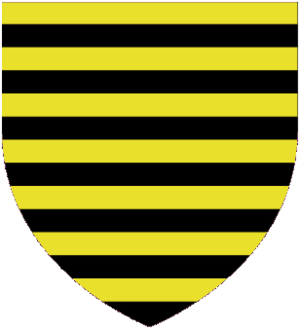William de Thorpe facts for kids
Quick facts for kids
Sir William de Thorpe
|
|
|---|---|

Arms: Barry of fourteen Or and Sable.
|
|
| 29th Lord Chief Justice of England | |
| In office 26 November 1346 – 26 October 1350 |
|
| Monarch | Edward III |
| Prime Minister | Henry of Grosmont, 1st Duke of Lancaster (as Lord High Steward) |
| Chancellor | John de Ufford (1346–1349) John of Thoresby (1349–1350) |
| Preceded by | William Scott |
| Succeeded by | William de Shareshull |
| Personal details | |
| Died | 27 May 1361 |
| Nationality | English |
Sir William de Thorpe (who passed away on May 27, 1361) was an important English lawyer. He served as the Chief Justice of the King's Bench from November 26, 1346, to October 26, 1350. He was given the title of Knight in 1345. This happened at the same time he became a judge for the King's Bench.
Who Was Sir William de Thorpe?
Sir William de Thorpe was a well-known figure in England during the 1300s. He held a very important job as the top judge in the country. This role meant he was in charge of many legal cases.
His Career as a Judge
Sir William de Thorpe started his journey in law. He became a judge in 1345. Soon after, he was made the Chief Justice of the King's Bench. This was a very powerful position. He worked directly for the King, Edward III, helping to make sure laws were followed.
Later Life and Challenges
Sir William de Thorpe became quite wealthy. He owned a lot of land, especially in an area called Lincolnshire. In 1350, he faced some serious trouble. He was put in prison and lost his property for a time. However, by 1351, he was pardoned. This meant he was forgiven, and his property was given back to him.
The next year, he took on another important role. He became a baron of the exchequer. This job involved managing the country's money. He also worked on various other special projects for the government. In 1357, he had a disagreement with the church. He was removed from the church for a time. This happened because he did not show up for a trial in a city called Avignon. The trial involved a bishop named Thomas de Lisle.
Sir William de Thorpe also had a son. His son was named William, just like him.

